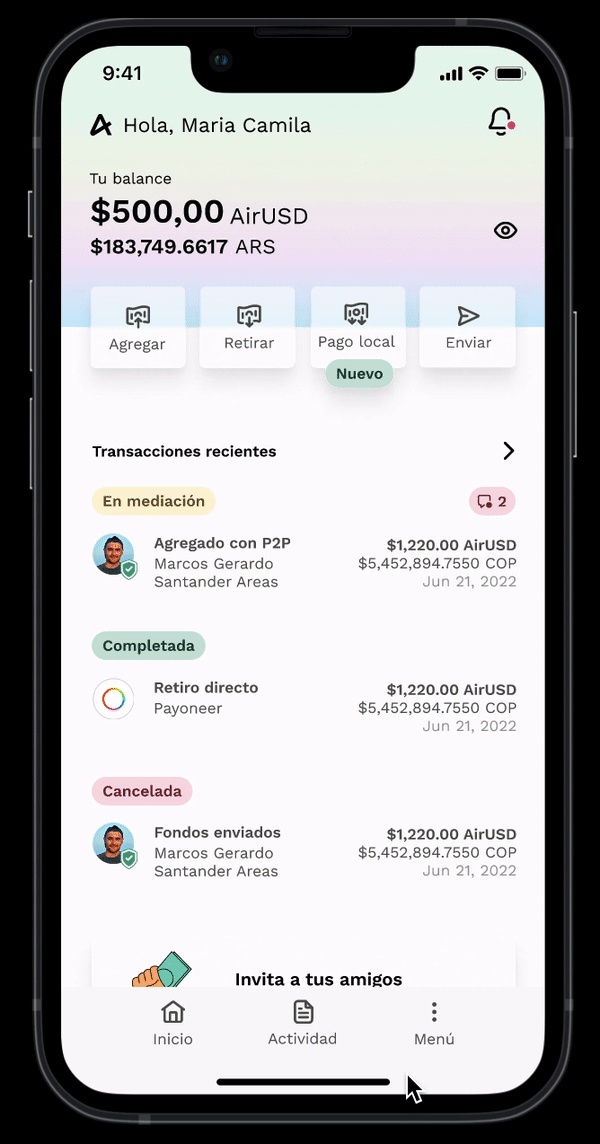
The project
Airtm is a fintech platform that connects people across the globe to a dollar-based economy, enabling them to send, receive, and convert funds securely, regardless of local currency restrictions. The platform empowers users with financial freedom, offering access to virtual wallets, peer-to-peer exchanges, and global payment solutions.
The goal
Support the Airtm product team in redefining the app experience to serve better the growing market of digital entrepreneurs, particularly data labelers, microtaskers, and freelancers in emerging economies. This involved improving financial flows, onboarding, and verification processes to ensure accessibility, trust, and scalability in a fast-evolving digital work landscape.
My role
Included product strategy, UX research, UI design, documentation, and QA. I worked end-to-end with cross-functional teams, delivering solutions aligned with both user needs and business goals, always focused on usability, data-informed decisions, and design consistency across the platform.



Before rebranding
After rebranding
The rebranding
The challenge
Partway through Airtm’s brand relaunch, announced for October 4, 2022, the company pivoted toward serving digital entrepreneurs. The rebrand introduced a fresh visual identity centered around a prism-inspired logo and renewed messaging to position Airtm as a platform empowering digital-first workers globally.
My approach
As part of this shift, we needed to refresh the app’s look and feel to align with the new brand, just months before launch. Instead of rebuilding the app, I led a design strategy to implement high-impact, low-effort visual updates, modernizing color palettes, iconography, and key UI patterns to reflect the prism theme, while preserving the existing layout and flows.
This enabled Airtm to launch on time with a cohesive brand presence across its fintech tools for the new target, supporting their access to global echonomy.
Desktop app
I led the full UI redesign, and the user research, UX strategy for different features, simplifying key flows like Add and Withdraw funds. We introduced updated visuals aligned with the new brand, refined the information architecture, and extended the design system across desktop.
The impact
Insights showed that 84% of withdrawals were processed via P2P in under 15 minutes. Our redesign helped optimize for speed and a better understanding of the product , supporting Airtm’s mission to empower digital workers globally.



Mobile app
I helped lead the redesign of Airtm’s mobile app, reinforcing a mobile-first strategy to better serve digital entrepreneurs. Before, most users relied on desktop, but post-launch data showed a clear shift; over 60% of transactions now happen on mobile, confirming the app’s growing impact and relevance.

Design system
Although Airtm’s rebranding brought a new visual identity, it didn’t include a design system. I led the creation of a scalable system in just one month, standardizing components, reducing design and dev time, and improving team efficiency across platforms.

Research
At Airtm, I led end-to-end research efforts to ensure our product aligned with the real needs of digital entrepreneurs. This included conducting usability tests, user interviews, stakeholder workshops, and prototyping sessions. I worked closely with both users and internal teams to validate ideas early, uncover friction points, and test proposed solutions.
One key initiative involved redesigning key financial flows, where I balanced business requirements, regulatory constraints, and technical limitations to deliver a seamless user experience. The insights gathered through this process directly informed design decisions and helped the team move into implementation with greater clarity and confidence.

QR Payments
In addition to improving existing flows, I contributed to the design of new features that supported Airtm’s evolving strategy. Collaborating with a dedicated UX researcher, we gathered deeper insights and brought a more structured approach to discovery.
Together, we also helped define key product metrics that had previously been unclear, enabling the team to measure impact, track success, and prioritize future improvements based on data.